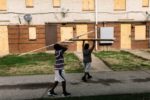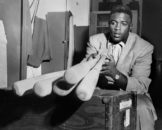 Featured – Ruth Ben-Ghiat on Trump and the bitter American truth: “We do not have a real democracy.” By Chauncey DeVega / Salon
Featured – Ruth Ben-Ghiat on Trump and the bitter American truth: “We do not have a real democracy.” By Chauncey DeVega / Salon
Ruth Ben-Ghiat is a professor of history and Italian studies at New York University and an expert in fascism and authoritarianism. She is the author of “Fascist Modernities: Italy 1922-1945” and “Italian Fascism’s Empire Cinema” and other books. In this conversation she warns that Trump’s threats of violence against the American people — including against leading Democrats like Barack Obama and Hillary Clinton — are very real. Ben-Ghiat also explains that the American news media normalized Donald Trump because most journalists are unable to admit that the United States is a failing democracy. Read more
Related: American Catastrophe Through German Eyes. By Roger Cohen / NYT
Related: Trump’s private army is scarier than you think. By Elizabeth Goiten / Justsecurity
 Portland protesters worry violence is taking away from Black Lives Matter message. By Trevor Hughes / USA Today
Portland protesters worry violence is taking away from Black Lives Matter message. By Trevor Hughes / USA Today
“A lot of the people who are doing it are not Black. They throw shit and start shit and run away and yell ‘Black Lives Matter,’ and then go home and take off their clothes. But I can’t take off my black,” Phillips said. “And the more damage they do to this building— well, everyone thinks it’s people of color doing all this and it’s not. “ Read more
Related: How One of America’s Whitest Cities Became the Center of B.L.M. Protests. By Thomas Fuller / NYT
 “Trump Could Not Be More on the Wrong Side”: New Poll Shows Trump’s Black Lives Matter Protest Response Could Cost Him 2020. By Peter Hamby / Vanity Fair
“Trump Could Not Be More on the Wrong Side”: New Poll Shows Trump’s Black Lives Matter Protest Response Could Cost Him 2020. By Peter Hamby / Vanity Fair
Trump’s reaction to the protests was not the only reason for his summer collapse. Most pollsters say that Trump’s continuing inability to respond to the coronavirus pandemic, and the economic havoc that’s come with it, has been the dominant factor. And last week, for the first time, polls began to show Biden beating Trump on the question of who would best handle the economy, the only decent card left in Trump’s deck. But if Trump loses in November, the nationwide protests against racism and police brutality that erupted in early June have to be seen as a significant breaking point. Read more
Related: Can Trump Win in November by Reviving Willie Horton? By Jeet Heer / The Nation
 Did protests change Americans’ views of race and policing? Yes, but it’s complicated. By David Byler / Wash Post
Did protests change Americans’ views of race and policing? Yes, but it’s complicated. By David Byler / Wash Post
A month ago, there wasn’t enough data and not enough time had passed to answer this question. But more than two months after Floyd’s death, a clearer picture is forming. The protests moved the public toward police reform and more liberal racial attitudes in a substantive way — but this set of issues is not immune to the forces of polarization or backlash. Read more
 27 U.S. mayors: Want to address systemic racism? Start with housing. By 27 U.S. Mayors / Wash Post
27 U.S. mayors: Want to address systemic racism? Start with housing. By 27 U.S. Mayors / Wash Post
Many of the critical resources in the Cares Act will soon run out or expire on July 31. If our representatives are serious about creating racial equity, the path forward is clear: We must dismantle the systems that keep disparities locked in place. Our nation’s housing system — and the programs and policies that perpetuate racial disparities in housing — is the best place to start. Read more
Related: In housing, a surprising piece of evidence the fight against racism is working. By Editorial Board / Wash Post
Related: One home, a lifetime of impact. By Michele Lerner / Wash Post
 John Lewis and the Danger of Gradualism. Patience Is a Dirty Word. By Ibram X. Kendi / The Atlantic
John Lewis and the Danger of Gradualism. Patience Is a Dirty Word. By Ibram X. Kendi / The Atlantic
Someone delivered an advance copy of Lewis’s speech to Patrick O’Boyle, the archbishop of Washington, who was giving the march’s opening invocation. O’Boyle was horrified to see that Lewis intended to callpatience a “dirty and nasty word.” O’Boyle called the White House. He called the march organizer Bayard Rustin. O’Boyle threatened to pull out, Rustin told Lewis, because he found the line offensive to the Catholic Church—Catholics believed in the word patience. But he kept the message. “To those who have said, ‘Be patient and wait,’ we have long said that we cannot be patient,” Lewis said that day. “We do not want our freedom gradually, but we want to be free now!” Read more
Related: Mitch McConnell’s complicated history on the Voting Rights Act. By Janell Ross / NBC News
 Tom Cotton, GOP senator, introduces bill to prohibit use of federal funds to teach 1619 Project. By Clare Foran / CNN
Tom Cotton, GOP senator, introduces bill to prohibit use of federal funds to teach 1619 Project. By Clare Foran / CNN
Republican Sen. Tom Cotton of Arkansas has introduced legislation that takes aim at the teaching of the 1619 Project, an initiative from The New York Times that reframes American history around the date of August 1619 when the first slave ship arrived on America’s shores. A statement from the senator’s office announcing the bill introduction states that the legislation will be titled the Saving American History Act of 2020 and “would prohibit the use of federal funds to teach the 1619 Project by K-12 schools or school districts. Schools that teach the 1619 Project would also be ineligible for federal professional-development grants.” Read more
 Congress moves forward in face of Trump veto threat to remove Confederate names from bases. By Jeremy Herb / CNN
Congress moves forward in face of Trump veto threat to remove Confederate names from bases. By Jeremy Herb / CNN
The provisions requiring the names of the bases to be changed — the Senate’s bill gives the Pentagon three years, while the House requires the task be completed within one year — are another sign of the political shift that’s followed nationwide protests of police brutality and racial injustice after the killing of George Floyd in Minneapolis police custody. Read more
Related: Confederate Figures Removed From Virginia Capitol In The Dead Of Night. By David Welina / NPR
 It’s my constitutional freaking right’: Black Americans arm themselves in response to pandemic, protests. By Maya King / Politico
It’s my constitutional freaking right’: Black Americans arm themselves in response to pandemic, protests. By Maya King / Politico
When coronavirus lockdowns spread nationwide in March, millions of Americans flocked to their local grocery stores and wholesale markets to stock up for what would become months stuck at home. Black Americans did the same, but some had one addendum to their shopping list: a firearm. Since the beginning of the pandemic, there has been growing interest among African Americans in arming themselves, as evidenced by increased membership in Black gun owner organizations. Read more
 The racist effects of school reopening during the pandemic — by a teacher. By Nataliya Braginsky and Valerie Strauss / Wash Post
The racist effects of school reopening during the pandemic — by a teacher. By Nataliya Braginsky and Valerie Strauss / Wash Post
Dismayed by plans to reopen schools amid the growing coronavirus pandemic, Braginsky has written the following post, a powerful piece that takes up the question of why black, indigenous and Latinx students would be prone to see more deaths from covid-19 in their schools than white students. Read more
 Coronavirus pandemic tearing through Latino communities – and it may get worse. By Jorge L. Ortiz / USA Today
Coronavirus pandemic tearing through Latino communities – and it may get worse. By Jorge L. Ortiz / USA Today
A new study published Thursday, the first nationwide analysis of COVID-19 cases and deaths among Latinos, concludes that crowded housing arrangements and high-risk jobs in industries like meatpacking, poultry and hospitality are among the major reasons Latinos have been disproportionately impacted by the pandemic. Read more
 Lebron James, Other Athletes Help Pay Debt of Former Felons. By Ishena Robinson / The Root
Lebron James, Other Athletes Help Pay Debt of Former Felons. By Ishena Robinson / The Root
More Than A Vote, a group founded by LeBron James and others in June to fight against voter suppression, says it will donate $100,000 to help pay the outstanding debts of people who have already served time for their felony convictions but are still unable to vote in Florida. Read more
 Jackie Robinson’s Inner Struggle. By Jon Meacham / NYT
Jackie Robinson’s Inner Struggle. By Jon Meacham / NYT
“There I was,” Robinson recalled in his 1972 memoir “I Never Had It Made: An Autobiography,” “the Black grandson of a slave, the son of a Black sharecropper, part of a historic occasion, a symbolic hero to my people.” So far, so good: The safe narrative of Robinson-as-stoic-hero is intact. “The band struck up the national anthem,” he wrote. “It should have been a glorious moment for me as the stirring words … poured from the stands.” Yet if we see the scene through Robinson’s eyes — and hear the anthem through his ears — we encounter an altogether different story. Read more
Visit our home page for more articles, book/podcast and video favorites. And at the top of this page register your email to receive notification of new editions of Race Inquiry Digest. Click here for earlier Digests.
Use the buttons below to share the Digest in an email, or post to your Facebook, Linkedin or Twitter accounts.